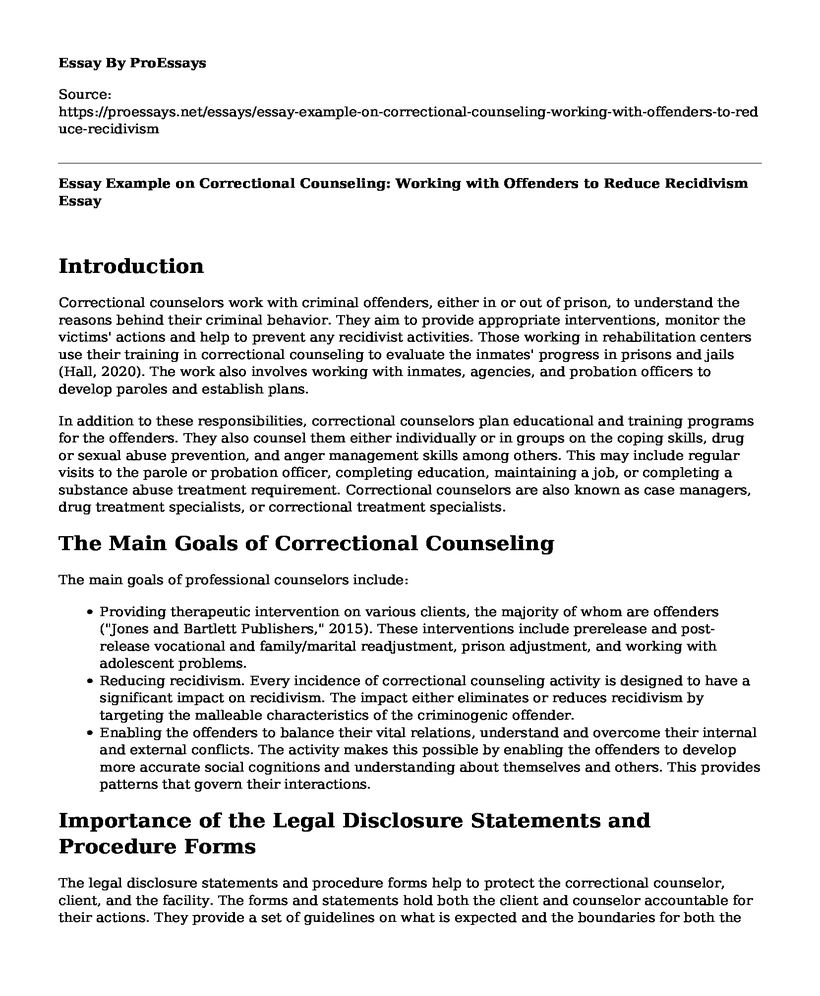Introduction
Correctional counselors work with criminal offenders, either in or out of prison, to understand the reasons behind their criminal behavior. They aim to provide appropriate interventions, monitor the victims' actions and help to prevent any recidivist activities. Those working in rehabilitation centers use their training in correctional counseling to evaluate the inmates' progress in prisons and jails (Hall, 2020). The work also involves working with inmates, agencies, and probation officers to develop paroles and establish plans.
In addition to these responsibilities, correctional counselors plan educational and training programs for the offenders. They also counsel them either individually or in groups on the coping skills, drug or sexual abuse prevention, and anger management skills among others. This may include regular visits to the parole or probation officer, completing education, maintaining a job, or completing a substance abuse treatment requirement. Correctional counselors are also known as case managers, drug treatment specialists, or correctional treatment specialists.
The Main Goals of Correctional Counseling
The main goals of professional counselors include:
- Providing therapeutic intervention on various clients, the majority of whom are offenders ("Jones and Bartlett Publishers," 2015). These interventions include prerelease and post-release vocational and family/marital readjustment, prison adjustment, and working with adolescent problems.
- Reducing recidivism. Every incidence of correctional counseling activity is designed to have a significant impact on recidivism. The impact either eliminates or reduces recidivism by targeting the malleable characteristics of the criminogenic offender.
- Enabling the offenders to balance their vital relations, understand and overcome their internal and external conflicts. The activity makes this possible by enabling the offenders to develop more accurate social cognitions and understanding about themselves and others. This provides patterns that govern their interactions.
Importance of the Legal Disclosure Statements and Procedure Forms
The legal disclosure statements and procedure forms help to protect the correctional counselor, client, and the facility. The forms and statements hold both the client and counselor accountable for their actions. They provide a set of guidelines on what is expected and the boundaries for both the client and the counselor. The disclosure statements aim at encouraging the client to deepen their level of self-exploration and improve their therapeutic relationship with the counselor.
Legal ramifications of violating ethical guidelines
Correctional officers who violate the professional code of ethics or any of its provisions get sanctioned accordingly ("Correctionalofficer.org," 2020). The consequences of gross violations are harsher punishments, that include forced resignation and even dismissal from work (in the event of administrative cases), and court proceedings (for the breaches that entail criminal offenses). Some of the violations include taking part in corrupt activities, smuggling of illegal substances, fraternizing with the stipulated charges (that include parolees or convicts that are conditionally released) or their family members, and any form of disrespect to the rights of the victims.
Importance of Informing the Offenders of the Legal Obligations of the Correctional Counselor
Disclosure is a vital aspect when examining the therapeutic boundaries. This calls for the inmates and offenders to be informed of the legal obligations of the correctional counselor because:
- Some counselors believe that whatever is appropriate (which is ambiguous) while others believe that nothing should be disclosed to the client. The legal obligations aid in establishing a balance so that none of the parties feels used or misused.
- Clients as they get into a counseling agreement, are often assured of their confidentiality whose limits should be respected by the counselor. This would help to encourage honesty from the client and enhances security when they get to know that their private information will not be disclosed to irrelevant parties.
- The clients must be aware that their counselor could be required to provide evidence in court and when they decide to withhold the information at the hearing, then they would be held in contempt of court. He/she should also be aware that their files can also be summoned by the court.
- Disclosures encourage the client to deepen their level of self-exploration which improves the therapeutic relationship between the client and the counselor. The client will also be able to understand the legal and ethical roles of the counselor to ensure that they offer their duties accordingly without infringing on the client's rights.
References
"Correctionalofficer.org" (2020). Principles of professional conduct. Correctionalofficer.org. https://www.correctionalofficer.org/professional-conduct
Hall, S. (2020). Roles of correctional counselors. Chron.com https://work.chron.com/roles-correctional-counselors-17914.html
"Jones and Bartlett Publishers" (2015). The goal of correctional counseling. Jones and Bartlett Publishers. https://samples.jblearning.com/0763741140/Correctional_Counseling_Chapter_3.pdf
Cite this page
Essay Example on Correctional Counseling: Working with Offenders to Reduce Recidivism. (2023, May 03). Retrieved from https://proessays.net/essays/essay-example-on-correctional-counseling-working-with-offenders-to-reduce-recidivism
If you are the original author of this essay and no longer wish to have it published on the ProEssays website, please click below to request its removal:
- The Morality of Suicide: The Divergent and Convergent Views
- Research Paper on Music Therapy and Effects of Music on Psychological and Mental Health
- Happiness During American Suburbanization Essay
- Essay Sample on Soft Skills: Essential for Professional Success
- 3 Recruiting Methods to Select Quality Hotel Manager Applicants - Essay Sample
- Adolescence: A Critical Analysis of Health and Impact - Research Paper
- Essay Sample on Age Discrimination in the Workplace: A Common Problem







